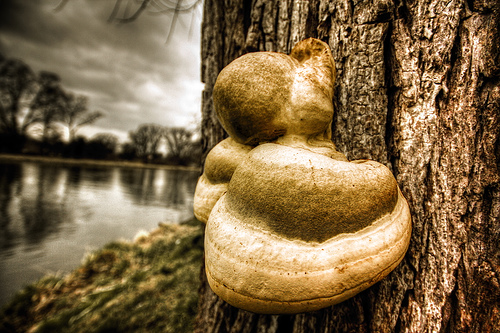
Photo: gari.baldi, Creative Commons, Flickr
Microbes are a class of living organisms that include bacteria, viruses and fungi.
We usually associate them with illness, but like Republicans they also come in good varieties, and the best of these not only protect our digestive tract, but literally feast on oil.
In the latter category, certain specially selected microbes are capable of cleaning up an oil spill with the sort of silent but remarkable prestidigitation associated with David Blaine. The microbes, however, do it for free and rarely allow sleight of hand to become a slip of the hand.
One such collection, developed by the U.S. Department of Energys (DOE) Savannah River National Laboratory (SRNL), has earned a spot on Nanotech Briefs 4th annual Nano 50 list.
Nanotech Briefs, which covers the rapidly advancing field of nanotechnology, highlights the top 50 nanotechnology innovators, products and advances in the field. Nanotechnology is engineering at the molecular (and sub-molecular) level to create systems which function in discrete ways. A prime and easily recognizable example of nano would be carbon nanotubes used to develop sophisticated, third-generation electronics.
BioTiger is the ultimate payoff for eight years of painstaking work by scientists. The journey began, literally, in Poland, with DOE funding directed at discovering microbes that had a taste for oil.
The team and its Polish counterparts were ultimately successful at developing microbes from the site that broke down the oil to simple carbon dioxide and other natural compounds and restored the century-old waste pond to such an extent that deer could graze on it with no ill effects.
BioTiger may have other uses as well, both residential and large-scale commercial. Applied to foundations or driveways, it cleans up oil spills and seepage without producing noxious volatile organic compounds, or VOCs, like most commercially available products. It wont leave you feeling breathless and ill, like gasoline, and it doesnt leave behind an oily residue that can make pets or wild animals like squirrels and rabbits sick.
Commercially, it shows great promise as a non-toxic ally for increasing oil recovery from oil sands. Oil sands, a complex mixture of clay, sand, water and bitumen, currently have to be heated and flushed with vast amounts of water, and the resulting slurry heated again, or upgraded to produce a fluid that can be pumped through pipelines. The result is polluted water from the tailing ponds and facilities, as well as the chemicals used to thin the slurry to fluid.
These oil sands, which represent about half of Canadas production, also supply nearly a quarter of U.S. oil. The U.S. has its own oil sands, in Utah and Wyoming, but these reserves have not been made commercially viable.
Concern about the environmental impact of oil sands recovery has made this Canadian resource "threat No. 1," at least according to former DOE official David Pumphrey, now a senior fellow at the Centre for Strategic and International Studies. To bolster his objections, Pumphrey cites bills pending before Congress, some of which would penalize oil sands on the basis that they produce significantly more greenhouse gas emissions than conventional oil production.
Using BioTiger microbes, oil is more easily separated from the clay/sand mixture, meaning less water and more efficient separation without the vast amounts of energy required for upgrading (an energy ratio that makes the oil sands not only environmentally negative but financially problematical). A test of the process showed BioTiger separating 50 percent more oil than conventional processes in four hours, and a whopping 500-percent increase within a single day.
Its a remarkable proof that may also help oil shale and secondary oil recovery companies clean up their acts. The American economy has been oil-fed for so long that the weaning process wont happen overnight, no matter how much our appetite degrades the landscape. In fact, if the oil companies have their way, the weaning wont happen until all the sources run dry. This makes BioTiger the sort of innovative and timely product that will allow us to have our cake and eat it, too, while our invisible little microbe friends feast equally as happily on Exxon spills.
BioTiger is a win-win for oil and the environment, and it doesnt get much better than that.
Disclosure: I don’t own stock in nano.